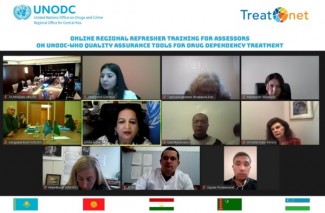The Regional Mission to Central Asia of the United Nations Office on Drugs and Crime (UNODC) is organizing a regional online training for national assessors experts on the use of UNODC/WHO-designed insights

The five-day regional online training on the skills of UNODC/WHO assessment experts on quality drug treatment has begun on 12 October 2020. The aim of the training is to strengthen institutional support to ensure the successful implementation of the UNODC/WHO drug treatment services in Central Asia and to promote a scientific approach to the quality of drug treatment and drug care services.
Following the launch of the International Standards for the Treatment of Drug Disorders, WHO/UN/UN resolution 59/4 by the Commission on Drugs (which calls for the development and dissemination of international standards for the treatment of drug-related disorders) and urges UNODC to support a systematic process of national adaptation and the adoption of national quality standards for accreditation of services under national law), the need for new globally applicable tools based on a coherent distribution strategy has been proposed to ensure a qualified and effective response to drug-related disorders around the world.
The development of such standards for the quality of drug treatment services is necessary to be able to evaluate best practices based on scientific and ethical principles. Quality standards also help to ensure that quality standards and opportunities for drug addicts are maintained by the health system for anyone with any other chronic disease.
A regional online refresher course for national assessor experts and other national experts involved in the development of national quality standards will focus on the following actions related to the continued implementation of quality standards in Central Asia:
- Presentation of achievements in Central Asia based on the results of pilot initiatives;
- Update on WHO/UNODC International Standards 2020 and a new set of service quality control tools from UNODC/WHO and Consensus Standards.
- Discussion of quality control standards with an emphasis on what is currently lacking in Central Asia.
- Focus on how to evaluate and plan improvements.
- Identify the changes needed in each country after pilot projects and the next steps to adopt international quality standards and develop national quality standards
Ms. Ashita Mittal, UNODC Regional Representative for Central Asia, stressed that "these standards must be globally applicable and consistent with the International Standards for the Treatment of Disorders Caused by UNODC and WHO, as well as to support politicians, health service managers and practitioners to enhance their capacity to provide quality services for drug treatment and care for drug addicts." She also took the opportunity to thank national partners for their commitment to implementing UNODC quality standards and tools by establishing working groups to adapt and test UNODC quality standards and tools for drug treatment services in 2019.
This training is part of UNODC's GLOBAL GLOJ71 Project "Treatment of Drug Addiction and Its Health Effects: Treatnet II"